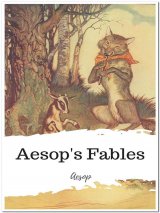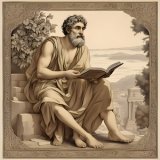Aesop's Fables Page #16
Aesop's Fables, or the Aesopica, is a collection of fables credited to Aesop, a slave and storyteller believed to have lived in ancient Greece between 620 and 564 BCE.
THE COBBLER TURNED DOCTOR A very unskilful Cobbler, finding himself unable to make a living at his trade, gave up mending boots and took to doctoring instead. He gave out that he had the secret of a universal antidote against all poisons, and acquired no small reputation, thanks to his talent for puffing himself. One day, however, he fell very ill; and the King of the country bethought him that he would test the value of his remedy. Calling, therefore, for a cup, he poured out a dose of the antidote, and, under pretence of mixing poison with it, added a little water, and commanded him to drink it. Terrified by the fear of being poisoned, the Cobbler confessed that he knew nothing about medicine, and that his antidote was worthless. Then the King summoned his subjects and addressed them as follows: "What folly could be greater than yours? Here is this Cobbler to whom no one will send his boots to be mended, and yet you have not hesitated to entrust him with your lives!" THE ASS, THE COCK, AND THE LION An Ass and a Cock were in a cattle-pen together. Presently a Lion, who had been starving for days, came along and was just about to fall upon the Ass and make a meal of him when the Cock, rising to his full height and flapping his wings vigorously, uttered a tremendous crow. Now, if there is one thing that frightens a Lion, it is the crowing of a Cock: and this one had no sooner heard the noise than he fled. The Ass was mightily elated at this, and thought that, if the Lion couldn't face a Cock, he would be still less likely to stand up to an Ass: so he ran out and pursued him. But when the two had got well out of sight and hearing of the Cock, the Lion suddenly turned upon the Ass and ate him up. False confidence often leads to disaster. THE BELLY AND THE MEMBERS The Members of the Body once rebelled against the Belly. "You," they said to the Belly, "live in luxury and sloth, and never do a stroke of work; while we not only have to do all the hard work there is to be done, but are actually your slaves and have to minister to all your wants. Now, we will do so no longer, and you can shift for yourself for the future." They were as good as their word, and left the Belly to starve. The result was just what might have been expected: the whole Body soon began to fail, and the Members and all shared in the general collapse. And then they saw too late how foolish they had been. THE BALD MAN AND THE FLY A Fly settled on the head of a Bald Man and bit him. In his eagerness to kill it, he hit himself a smart slap. But the Fly escaped, and said to him in derision, "You tried to kill me for just one little bite; what will you do to yourself now, for the heavy smack you have just given yourself?" "Oh, for that blow I bear no grudge," he replied, "for I never intended myself any harm; but as for you, you contemptible insect, who live by sucking human blood, I'd have borne a good deal more than that for the satisfaction of dashing the life out of you!" THE ASS AND THE WOLF An Ass was feeding in a meadow, and, catching sight of his enemy the Wolf in the distance, pretended to be very lame and hobbled painfully along. When the Wolf came up, he asked the Ass how he came to be so lame, and the Ass replied that in going through a hedge he had trodden on a thorn, and he begged the Wolf to pull it out with his teeth, "In case," he said, "when you eat me, it should stick in your throat and hurt you very much." The Wolf said he would, and told the Ass to lift up his foot, and gave his whole mind to getting out the thorn. But the Ass suddenly let out with his heels and fetched the Wolf a fearful kick in the mouth, breaking his teeth; and then he galloped off at full speed. As soon as he could speak the Wolf growled to himself, "It serves me right: my father taught me to kill, and I ought to have stuck to that trade instead of attempting to cure." THE MONKEY AND THE CAMEL At a gathering of all the beasts the Monkey gave an exhibition of dancing and entertained the company vastly. There was great applause at the finish, which excited the envy of the Camel and made him desire to win the favour of the assembly by the same means. So he got up from his place and began dancing, but he cut such a ridiculous figure as he plunged about, and made such a grotesque exhibition of his ungainly person, that the beasts all fell upon him with ridicule and drove him away. THE SICK MAN AND THE DOCTOR A Sick Man received a visit from his Doctor, who asked him how he was. "Fairly well, Doctor," said he, "but I find I sweat a great deal." "Ah," said the Doctor, "that's a good sign." On his next visit he asked the same question, and his patient replied, "I'm much as usual, but I've taken to having shivering fits, which leave me cold all over." "Ah," said the Doctor, "that's a good sign too." When he came the third time and inquired as before about his patient's health, the Sick Man said that he felt very feverish. "A very good sign," said the Doctor; "you are doing very nicely indeed." Afterwards a friend came to see the invalid, and on asking him how he did, received this reply: "My dear friend, I'm dying of good signs." THE TRAVELLERS AND THE PLANE-TREE Two Travellers were walking along a bare and dusty road in the heat of a summer's day. Coming presently to a Plane-tree, they joyfully turned aside to shelter from the burning rays of the sun in the deep shade of its spreading branches. As they rested, looking up into the tree, one of them remarked to his companion, "What a useless tree the Plane is! It bears no fruit and is of no service to man at all." The Plane-tree interrupted him with indignation. "You ungrateful creature!" it cried: "you come and take shelter under me from the scorching sun, and then, in the very act of enjoying the cool shade of my foliage, you abuse me and call me good for nothing!" Many a service is met with ingratitude. THE FLEA AND THE OX A Flea once said to an Ox, "How comes it that a big strong fellow like you is content to serve mankind, and do all their hard work for them, while I, who am no bigger than you see, live on their bodies and drink my fill of their blood, and never do a stroke for it all?" To which the Ox replied, "Men are very kind to me, and so I am grateful to them: they feed and house me well, and every now and then they show their fondness for me by patting me on the head and neck." "They'd pat me, too," said the Flea, "if I let them: but I take good care they don't, or there would be nothing left of me." THE BIRDS, THE BEASTS, AND THE BAT The Birds were at war with the Beasts, and many battles were fought with varying success on either side. The Bat did not throw in his lot definitely with either party, but when things went well for the Birds he was found fighting in their ranks; when, on the other hand, the Beasts got the upper hand, he was to be found among the Beasts. No one paid any attention to him while the war lasted: but when it was over, and peace was restored, neither the Birds nor the Beasts would have anything to do with so double-faced a traitor, and so he remains to this day a solitary outcast from both.
Translation
Translate and read this book in other languages:
Select another language:
- - Select -
- 简体中文 (Chinese - Simplified)
- 繁體中文 (Chinese - Traditional)
- Español (Spanish)
- Esperanto (Esperanto)
- 日本語 (Japanese)
- Português (Portuguese)
- Deutsch (German)
- العربية (Arabic)
- Français (French)
- Русский (Russian)
- ಕನ್ನಡ (Kannada)
- 한국어 (Korean)
- עברית (Hebrew)
- Gaeilge (Irish)
- Українська (Ukrainian)
- اردو (Urdu)
- Magyar (Hungarian)
- मानक हिन्दी (Hindi)
- Indonesia (Indonesian)
- Italiano (Italian)
- தமிழ் (Tamil)
- Türkçe (Turkish)
- తెలుగు (Telugu)
- ภาษาไทย (Thai)
- Tiếng Việt (Vietnamese)
- Čeština (Czech)
- Polski (Polish)
- Bahasa Indonesia (Indonesian)
- Românește (Romanian)
- Nederlands (Dutch)
- Ελληνικά (Greek)
- Latinum (Latin)
- Svenska (Swedish)
- Dansk (Danish)
- Suomi (Finnish)
- فارسی (Persian)
- ייִדיש (Yiddish)
- հայերեն (Armenian)
- Norsk (Norwegian)
- English (English)
Citation
Use the citation below to add this book to your bibliography:
Style:MLAChicagoAPA
"Aesop's Fables Books." Literature.com. STANDS4 LLC, 2025. Web. 11 Jan. 2025. <https://www.literature.com/book/aesop%27s_fables_316>.




Discuss this Aesop's Fables book with the community:
Report Comment
We're doing our best to make sure our content is useful, accurate and safe.
If by any chance you spot an inappropriate comment while navigating through our website please use this form to let us know, and we'll take care of it shortly.
Attachment
You need to be logged in to favorite.
Log In